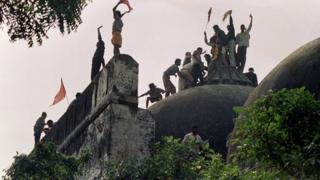 Image copyright
Image copyright
AFP
The dispute reached a flashpoint in 1992 when a Hindu mob destroyed a mosque at the site
Senior figures in India’s ruling party will be tried for criminal conspiracy over the destruction of a 16th Century mosque, the Supreme Court has ruled.
The order is seen as a huge setback for former BJP chief Lal Krishna Advani and his colleagues. The court said the trial must conclude within two years.
They deny making inflammatory speeches that encouraged Hindu mobs to tear down the Babri mosque at Ayodhya in 1992.
The riots that followed killed nearly 2,000 people.
Hindus claim the mosque was the birthplace of one of their most revered deities, Lord Ram, and that it was built after the destruction of a Hindu temple by a Muslim invader in the 16th Century.
Image copyright
Getty Images
Lal Krishna Advani (left) and Uma Bharti (right) have fought the case in the courts for years
The Central Bureau of Investigation (CBI) has always said the destruction of the mosque was a planned event.
Those accused along with Mr Advani, a former deputy prime minister, include senior BJP leaders Murli Manohar Joshi and Uma Bharti, who is in the current cabinet. They have all denied any wrongdoing.
In its order on Wednesday morning, the two-judge Supreme Court bench said that the trial must be completed in two years, that it would be held on “a day-to-day basis” and that “on no grounds, will it be adjourned”.
Since the court order, there has been no comment from Mr Advani or Mr Joshi, but Ms Bharti told reporters that there had been no conspiracy and that it was her dream to see the temple built.
“I want to tell the country it’s time for the Ram temple to be built. There is no conspiracy. Yes, I was there in Ayodhya on 6 December [when the mosque was demolished],” she said.
“Why should I regret it. I was involved in the Ayodhya incident. I remain unrepentant.”
The Supreme Court has been hearing the case since 2011 after setting aside a high court judgement which allocated two-thirds of the disputed site to Hindu groups, and the remainder to Muslims.
The Allahabad High Court ruling in 2010 addressed three major issues. It said the disputed spot was Lord Ram’s birthplace, that the mosque had been built after the demolition of a temple and that it was not built in accordance with the tenets of Islam.
For the first time in a judicial ruling, it also said that the disputed site was the birthplace of the Hindu god.
Hindus want a temple built at the site, while Muslims want a new mosque.
Last month, Chief Justice JS Khehar urged the two communities to settle the bitter dispute through negotiations and even offered to act as a mediator between the parties.
The case has already languished in India’s famously sluggish legal system for so long that most of the original petitioners have died.
Ayodhya dispute: India top court orders trial for BJP leaders}

